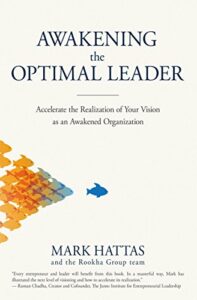
Anyone recovering from any illness can still be great leaders. Mark Hattas, the author of Awakening the Optimal Leader, influences leaders towards creating a work environment that prioritizes respect for culture and inner guidance. Today, Erin Saxton has an in-depth discussion with Mark about tuning into our optimal being, what that means, and how to keep the dialogue open at home and at work. By sharing his journey through mental health, Mark is a great example of optimal leadership, conquering illness, and healing through perseverance.
—
Listen to the podcast here:
Erin Keeps A Deep Conversation Light With New Life-Long Friend, Mark Hattas
With me is my friend, Mark Hattas. He is the author of Awakening the Optimal Leader. This is going to be fun. We have been friends for not too long. You know when you meet a friend that you meet somebody and you automatically are like, “I’ve known this person forever.” That’s you for me. Do you not feel the same way about me?
Yes, of course. We had fun.
We did have fun. What I like about it is we met at a work conference. I didn’t know too much about you. It was like unwrapping a gift, a crazy layered gift. Mark and I, we’re irreverent with each other. This interview may be off-putting to some because we laugh at ourselves and we have fun through laughter. We are transparent in our conversation. To kick that off in the spirit of our friendship, why don’t you tell people how I met you? Do the whole technology company intro.
I built and sold a technology company. We built it up to $20 million in sales. We had about 150 people. Nine months after that, I ended up in the psych ward, which needs to be unpacked a little bit. For three years, I go in and out of mental health and that whole world. I was told there’s no cure, that I’d be on medication for the rest of my life most likely. They had no idea what the cause was. Thankfully, after three years of that, I did find solutions. I’ve been now for years off all medications, very healthy, vibrant and bringing solutions for people in that world. Also, the things I learned I would have loved to have as an entrepreneur. I mentor and support and serve entrepreneurs and business leaders as well in cultural transformations and setting up for success.
My response was, “You grew a company to $20 million?” What’s wrong with me?
I said, “That’s the question you asked? What’s wrong with you?”
I was kidding. I was like, “Mental note, literally don’t build a company up so big that you need to get into the psych ward.” What about that? We’ve talked to friends that we think may be certain incidents in our lives, trigger moments, whether it’s a PTSD or you’re revealing an abuse or something and you need the right tools to deal with that. Where do you feel this was triggered? Was it the stress of running it, then you had nothing to do anymore and al of a sudden your body released? All kidding aside, walk me through it.
Any mental health challenges are very serious. On the other side of it, there’s a lot of joy. It’s a lot of fun to bring solutions to people.
Did the stress of selling the $20 million spark this or it just happened?
Here’s what my non-therapeutic assessment is. There was a model that I had for how to be. It was to be successful, be productive, be extraordinary. Mostly because I saw many people around me as I grew up that were successful and extraordinary, from mom and dad to other people. Everyone has different perceptions of that. When I didn’t feel adequate enough to reach where I thought I could be, there was this gap that grew. I put on a persona and another. I wanted to be liked. I wanted to please people. I want to build companies so that I could be wealthy and I didn’t have to depend on anybody. That was all stripped away, the awards, the accolades, the people asking me for my opinion. Suddenly, I’m at home and no one was asking me for my opinion anymore. There was an identity crisis. I was sitting in the dining room thinking, “Who am I?” I had spent so much time at work, so much time on work relationships that I don’t think my wife and I even knew each other anymore. I was 38 years old, she was 37. We had five children.
Any mental health challenge is very serious. Click To TweetHonestly, that’s intense. I get that. It’s lonely.
It was very lonely. Even though I was surrounded by people who loved me and I love them, but it was that shift. It was like a schism opened up, “Where did all that go? What do I do?” With some of the money that I had earned, I started to invest in things. I want to be part of something and they’re really stupid things and I lost a bunch of money. It took me a while to get grounded in who I was again and realize I’m not the business I created.
They say that with parenting too. Your identity as a parent isn’t how gifted your athlete is on the ice, but who he is off the ice or who she is off the soccer field. Is she or he polite? That’s a direct response or a reflection of your parenting, but not whether he scored five goals.
I would go even further. Who does he or she think they are when they don’t score the goals? What’s their perception? There is the parent’s perception, the kid’s perception. One of the things that I learned through this process is to allow for all of our children to be who they are. Our number one job is to be love in their presence. All the other stuff, the parenting rules or whatever we concocted as a good parent, that’s BS. It’s a belief system that we’ve concocted to have some decorum of comparison.
BS, belief system. Let’s cut to the chase. Now, you’re doing well?
Yes, healthwise.
You’ve created a new company.
Three of them.
Tell me about those.

Awakening the Optimal Leader: Accelerate the Realization of Your Vision as an Awakened Organization
First off, after I got healthy, I wanted to create a nonprofit. I joined with the Montague-Bauer and Wallin to create the Hattas Shay International Foundation. We have solutions for people with mental health. That was key. The second business is all around bringing organizational transformation. It’s about creating the culture in your environment and bringing the optimal skills to your environment so that you can have the culture that you want. When that happens, there’s an engagement level that grows. It looks like executive mentoring. It looks like going through a program we created called Optimal Being and allowing your teams to go through that. It’s a powerful transformative solution.
The book, here’s what happened. I’m going to go back a little bit. When I realized I was getting healthy, something happened. There’s a guiding system in all of us. It’s like an inner GPS system that guides us to happiness and wellbeing and what’s best not only for us individually, but our family, for our companies. What we do is support people in tuning into that and then aligning the organization to move into that as well. The book was an inspiration to share with people the possibilities of what could happen. It’s a feature story, but it’s not just the book. It’s about the potential of creating a custom version for each company.
What does that mean? Do you need a company with a certain number of employees? Could you even be doing this for a solopreneur?
Solopreneur, probably not. It would be someone with some employees.
What about a solopreneur who had a few different personalities?
Yes. I also had many personalities, but over time those also integrated. That’s a cool thing about this is we all have those inner voices, those inner critics or what have you. Some of us have named them. As the Optimal Being program was being implemented, one of the things that I started to achieve was the unification of that. Now, there’s one voice. It’s funny sometimes, serious other times. One of the gifts that came as I started to get well was this gift of story. It’s a fascinating story. It applies to all of us because each person who goes through the programs and receives the mentoring from our organization receives it differently. The gifts will show up. The gift of story for me was this incredible speed at which I could do something like this. This took 90 minutes to write.
It was amazing. I attribute it to the story of my son. In 2015, my son, Henry, was nine years old. He says, “Dad, would you lay down with me at night and share a story with me?” I said, “Sure.” Like any good parent, I go in and I’m trying to think of a story. The first story was like a turtle and a dog and a couple of characters. I was working at it. The next night he says, “Dad, would you lay down with me and share a story?” I said, “Sure.” I come up with another one. Then another night, another night. Six or seven nights go by and I run out of stories. Suddenly, I hear this clear inner guidance say, “Don’t tell him a story tonight. Allow a story to come,” which I didn’t wrap my mind around it just said.
That time you are thinking, “What’s the difference? I thought the dog and the turtle story was the story coming.”
I knew it was different because I was told, “Don’t do this. Do this.” This might sound strange to people who haven’t gone through a mental health thing, but I’m going to explain it here. Imagine this is the core of your being and you’ve layered on personas. Let’s say you’re operating from this persona. This persona, the true nature of your being wants to express, that’s what was coming out. Some might call it connectedness with God or source or the Holy Spirit, depending on your faith background. It’s the true nature of our being. It starts to come forward. The way it came forward for me is my lips began to move, words came out of my mouth and this story came out. It was the best story that ever came out of my mouth. At the time, I paid $5 to go see a movie and I was witnessing this story. At the end, I turned to Henry and I said, “What do you think of that?” I was in awe. What happened there? He takes his fingers out of his mouth, gives me a thumbs up and says, “Dad, that was good but I know it’s going to get better. I know you’re learning.” This is what my nine-year-old tells me. He was right.
Like any gift, the more we share it, the more it grows. It grew and grew until about a year and a half later, this came out in 90 minutes. The vision came with it to go into companies and do an intake about what’s their vision, what are they trying to create as a culture, where are they now, where are the roadblocks and create a hero’s journey story for these companies so that when new employees come, they can hand the book to the new potential employee let’s call it and say, “Before you work here, read this. See if you want to help create it.” They step in and they’re putting their stamp on it, but they’re all in. The number one issue in companies is engagement.
That’s an incredible onboarding process. Do you give this during an interview? This book’s amazing. It will set in 2037. At first you’re like, “What’s going on? It’s 2019.” I found myself going, “This is my friend, Mark. It’s 2019. He starts in 2017 and the book jumps to 2037,” then I went, “It’s a story.” I was like, “I thought his kids were younger. His kids are married in this. What?” It presented itself as a book that I thought was a business book, then I thought, “I guess I’m wrong.” I’m reading and I was like, “It’s something way bigger than that.” It is layered, but yet you are speaking from the source because I thought that there are many lessons and it’s such an easy, quick read. It’s digestible. I thought, “This guy is brilliant.”
You are not the business you created. Click To TweetYou realized I didn’t actually even know how it was written.
That’s what I thought, “He paid $5 to watch it like a movie.”
I got to experience it too.
This comes out of you letting go in that moment and writing?
I audio-recorded and had it transcribed, then it went to the editor but just editing for some minor things. The story was intact.
You’ll do this with other companies with their voice?
We will, our organization.
Many people work with you. Mentally, how are you doing now?
Mentally, I would say that I’m at the top of my game. I’m very in-tune. I know what I want. I didn’t always. How many entrepreneurs are out there that have what I call double-mindedness? It’s absolute indecision. That’s left. It used to be where I lived. Now, it’s a level of confidence and trust. I’m trusting myself. I’m trusting others. I’m trusting the universe. I’m trusting God. Trusting this world that we live in is really very orderly. I used to look at it as completely chaotic. Self-love is there. That used to be non-existent and the love of others is very high. That used to be nonexistent. It used to use people, not all people, but a lot of people as objects to achieve something. Now I see people as people. We get to do something together. It’s much more collaborative rather than competitive.
Or calculated.

Optimal Leadership: The more we share our gift, the more it grows.
That sounds like such a dirty word. It sounds manipulative.
Businesses are like chess, some people think. There’s strategy, there are pawns.
It’s how I was taught.
That’s what I’m saying, I understand. Before this, I thought that as well. Not that there wasn’t love. Honestly, I love everyone. I expressed that through my silliness and my playfulness. I want to talk to people that have gone through certain transitions and transformations because I think that there’s a lot of people that are scared. There’s a lot of people that don’t talk about things. I think that we all need to start being a little more open. If that means vulnerable, okay. It’s important because there’s somebody that’s listening that might not be ready to talk, but who’s ready to heal.
One of the things with people who are going through something like that, the greatest opportunity we have is to support someone going through a transformation. Many people are stuck cycling through their patterns. What if we can create an opportunity for our employees and our executives and team partners to move through some of that stuff with grace and ease? That’s what we’re about, supporting that.
What about now? Do you contact businesses who are going through mergers and acquisitions? How are you helping the Marks of the businesses that are being sold every day? I sold two companies. That first day after you don’t go to that office, I think I probably could have used a Mark Hattas.
Anyone who’s going through any life transition, any company transition could benefit from some of the stuff that we’re doing. The opportunity for everybody is to reconnect with the true nature of their being. From there, mine came in the form of story, but yours might come in the form of an acquisition or the next hire or a brilliant vision or brilliant execution strategy. By staying present there and then inviting your organization to do so as well, it leads to an acceleration of our vision and an expansion of the vision as well. A friend of mine read this. She’s written fifteen books or something. She said, “Mark, what I love about it was my vision of what I’m doing got big after reading this.” I was like, “Cool,” because I don’t know what everyone’s going to experience with it. The opportunity is there to support people in fully transforming. Imagine a suppressed caterpillar who is afraid to go build the chrysalis. There are a lot of people out there that are like that. Instead of turning inward toward allowing the transformation, they try to push it away. It leads to disaster.
It leads to nothing beautiful. I know what you mean. Sometimes, there’s so much in the world that can be done but people are afraid. There are people that are going after what they can do but then people think they are literally crazy. They’re the dabblers. They’re the entrepreneurs. They have their hands in so many cookie jars. We have a world where people truly have mental health issues. I think we all need to open our eyes a little more and talk to people more. Would you agree?
In a major way, I would but it’s how we talk to them. What you’re describing, think of it as an imaginary range. On the one end, you have someone thriving in all areas of their life. I don’t know anybody who has all of that put together, but let’s pretend. As we move down the scale, people have life issues. A divorce, a loss of someone, something happens in the business. They lose a deal or a partner or whatever it is. Something happens. Do we have the skills and capabilities to support ourselves and moving through that, staying connected to that inner guidance such that we can navigate back? If we judge ourselves or others hear or blame and push it away, that then grows into something that’s a little more significant. If we continue to push it away, it can start to look like what happened with me, a mental health diagnosis.
On the spectrum of a mental health diagnosis, 1 in 4 people in companies struggles with anxiety. Only half of them tell their employees or employer. What if we could give those whole range solutions to support that culture wherever they are, tuning in to their optimal being and making the best choice for them at that moment? By making the best choice for them, it’s making the best choice for the company because they chose to come there. If they know why they’re there and they’re tuned in with that, the ship starts to move in the direction that’s optimal.
The greatest opportunity we have is to support someone going through a transformation. Click To TweetYou bring up anxiety. Nervousness, worrywart, anxiety, they’re all different. I don’t know anybody who hasn’t experienced that. We used to get headaches. Let’s pretend that we wouldn’t be talking about that as much. These days it’s so easy. You just say, “I have a headache.” I have a feeling that if we can keep up the dialogue, we’ll be more open to saying, “I’m having anxiety right now.” It’s like saying, “I have a headache. I need an Aspirin or Ibuprofen. I need to meditate. I need lavender.” I’m not saying there are pills for everything. There’s no reason to be mealy-mouth about having a headache anymore.
Let’s say you say to your employer, “I have anxiety. I’m feeling anxious.” If that employer shuts you down and demeans you for not being able to come to the big meeting or what have you, that’s one approach. That will lead to that person probably not bringing it up and others too. Does the organization have the language and the support so when someone does come with that, they have the leadership tools to be able to support that individual? Support, some people might think, “Do I have to listen to this person for four hours as they process their stuff?” It doesn’t mean that. When you have the skills, it could be 30 or 10 minutes conversation, but it’s something that is going to be supportive of that person moving from anxiety into productivity and joy and that happy place where they’re going to bring it all, which is where we want our team anyway at home and work.
It comes down to finding out where it is. You’re saying spectrum, I’m saying sliding scale, but sliding, not downward or upward. Spectrum to me sounds like autism. We could be talking about that, but it’s not all-encompassing. It’s like where are you on the grid.
Everyone’s somewhere.
Everyone, if you’re fogging, a mirror is somewhere on this grid. If you’re alive, if you’re walking this Earth, you’re on the grid. Just because you’re on the grid doesn’t mean you have a mental illness or anxiety or even a headache. It means you’re alive. You fit on this optimal and you’re on the grid.
Different people at different times have judged people on the grid. There’s a thriving over there, and then maybe some people are judging the person here. Some are judging here. That creates a dynamic that’s destructive and it’s not healthy. It would be destructive. Can we bring solutions to support them where they’re at, wherever we are? As the leader of the organization, I was struggling with this. I wasn’t conscious and aware of it. I denied it. I was putting on such a show so that I could be perceived in a certain way. It’s good to have a vision, but many entrepreneurs get lost in that. I was living in my vision and not being present, but now I’m present. I have a vision and we’re moving toward it.
You are catching up to what facade you are creating.
Instead of doing that, just being and enjoying the being process.
If companies wanted to find out more about you and the work that all of you are doing, where can they go and check you out?
There are two things that I’ll share. One, on the mental health side because we talked about that, go to JourneysDream.org. On the business side, go to OptimalBeing.live. That will get access to us and me and communication. You could also email me at Mark@Rookha.com.

Optimal Leadership: We have inner GPS systems that guides us to happiness and well-being and what’s best for you and everyone around you.
Where can they buy this book?
This is on Amazon. It’s also on the OptimalBeing.live site and the JourneysDream.org site.
Thank you for your time.
Thanks, Erin.
I really do love you.
Thank you. I love you too.
We’ll see you soon.
Important Links:
- Awakening the Optimal Leader
- Hattas Shay International Foundation
- Optimal Being
- Mark@Rookha.com
- Optimal Being
- OptimalBeing.live
- JourneysDream.org
- https://www.LinkedIn.com/in/mhattas/
- https://www.Facebook.com/markhattas
- @MHattas – Twitter
- https://www.Amazon.com/Awakening-Optimal-Leader-Realization-Organization/dp/0999481509/ref=sr_1_1?keywords=awakening+the+optimal+leader&qid=1569357103&sr=8-1
- https://www.Amazon.com/Journeys-Success-Health-Wellness-Fitness-ebook/dp/B073SHFM8R/ref=sr_1_4?keywords=journey+to+success+volume+6&qid=1569357072&sr=8-4
About Mark Hattas
 Though it wasn’t always this way, I love my life. I live in appreciation and joy in most of my days. I experience life in awe often and teach, mentor and support others in how to do the same. I do this in my writings and via products and services that are effective and supportive. My teams and I have launched journeysdream.org, optimal being.live and beatitudespractice.com and more will soon be on its way. It is so fun to see people move from struggling to thriving. I love it!!!!
Though it wasn’t always this way, I love my life. I live in appreciation and joy in most of my days. I experience life in awe often and teach, mentor and support others in how to do the same. I do this in my writings and via products and services that are effective and supportive. My teams and I have launched journeysdream.org, optimal being.live and beatitudespractice.com and more will soon be on its way. It is so fun to see people move from struggling to thriving. I love it!!!!




